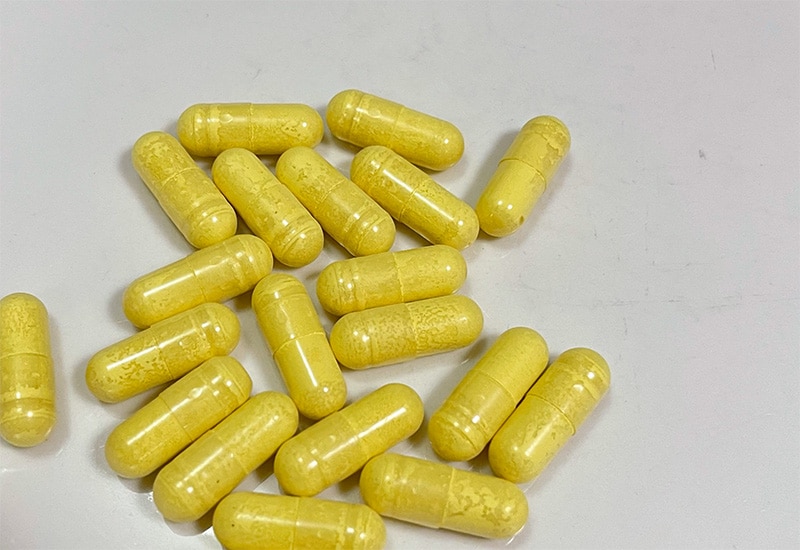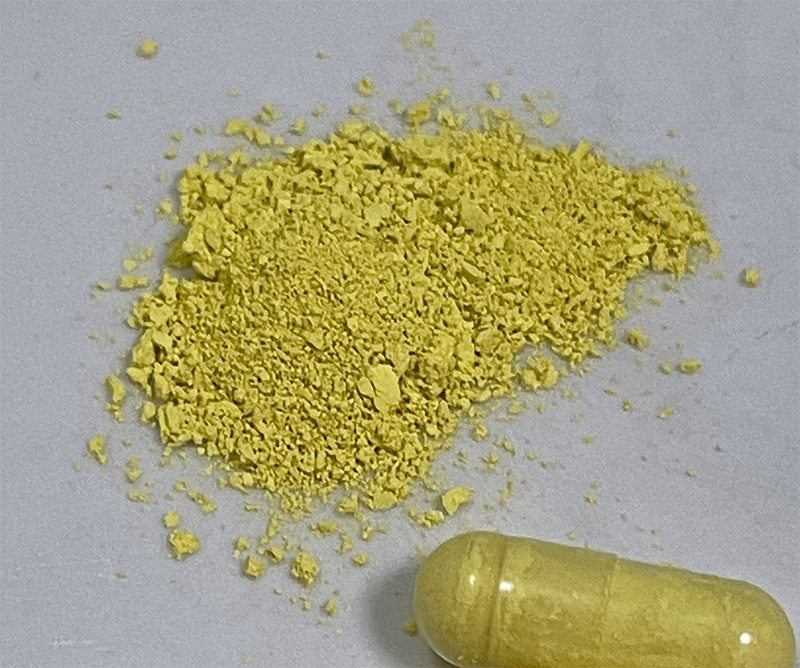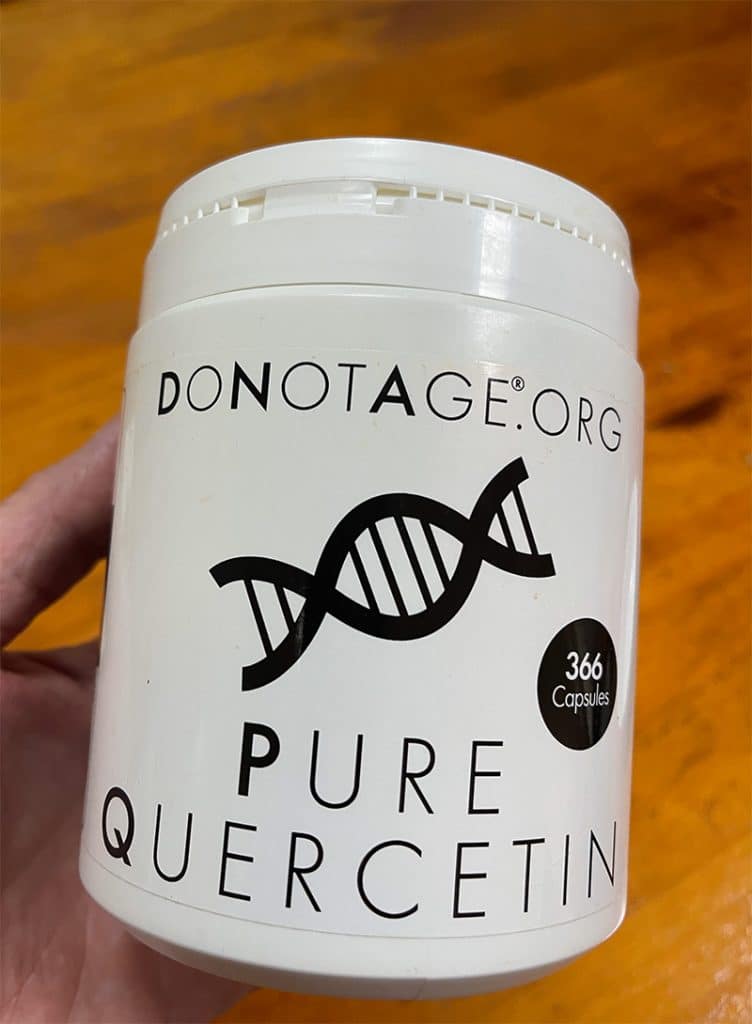Table of Contents
- What is Quercetin?
- Benefits of Quercetin
- Which foods have the highest levels of Quercetin
- Side Effects of Taking a Quercetin Supplement
- Interactions with Medications
- Common Questions Taking a Quercetin Supplement
- Recommended Quercetin Supplement brands
- Conclusion
- My Experience in the Longevity Field and how I Created this Article
References to Quercetin demonstrate great anti-inflammation, longevity, and a host of other benefits. In this short article, I discuss the key points you need to know about this flavonoid.
What is Quercetin?
Quercetin is one of the most researched and abundant flavonoids in nature found in most fruits and vegetables; Flavonoids are the chemicals in plants that give them their color and flavor, so as you would expect, colorful fruits, vegetables, and flowers usually have high levels of flavonoids such as Quercetin.
Quercetin is also known as Citrus Bioflavonoids, 3 4 5 7-pentahydroxylflavone, Sophoretin, Sophoretin, Quercitin, Xanthaurine, Flavin meletin, and Quertine.
Outside of fruits and vegetables, high levels of Quercetin are found in the following manufactured foods and drink coffee, red wine, chocolate olive oil, and green/black tea.

Benefits of Quercetin
As mentioned in our introduction Quercetin has received a lot of attention in recent years due to its anti-inflammation and antioxidant effects however there is a whole list of additional benefits that that include:
Anti-inflammation and Antioxidant Effects
Research suggests that Quercetin is a powerful anti-inflammatory due to its antioxidant properties, this anti-inflammatory effect has the potential to help fight chronic diseases like cancer, arthritis, diabetes, heart disease and aging. As Inflammation is a huge problem in our aging population this flavonoid could play a key role in helping people improve or manage these conditions.
One example of this is a small study that looked at a small group of rheumatoid arthritis sufferers the results showed reduced stiffness and pain in the morning in addition to a reduction in pain after exercise, another finding from the study was that according to the results the Quercetin group had a significant reduced in C-reactive protein (CRP), erythrocyte sedimentation rate (ESR) and plasma viscosity (PV) which are the markers for inflammation, this was compared to the placebo group
Specifically for Heart disease and stroke research several high-fat animal models showed reduced plaque when it was supplemented.
May Help Reduce Blood Pressure
Over the years there have been many studies and research into the effects of Quercetin on Blood Pressure one of which showed [ R ] that Blood Pressure in hypertensive people was on average reduced by 7 mm in systolic and 8 in diastolic for both women and men the research goes on to say that this amount of decrease in blood pressure usually translates to a decrease in stroke and heart disease mortality of between 14% and 9%, this is just one of the many studies I found showing Quercetin as having an effect on blood pressure.
Anti-Bacterial Effects
One recent study [ R ] of the anti-bacterial effects of quercetin showed great inhibitory effects on both bacteria and fungi experiments found results on Pseudomonas aeruginosa, Salmonella enteritidis, Staphylococcus aureus, Escherichia coli, Proteus, and Aspergillus flavus along with the growth of E. coli, S. aureus, and P. aeruginosa, these results are promising given how some of these bacteria are becoming antibiotic resistant, the hope is in the future that quercetin may play a role in controlling in fighting these bacterial. This study notes that there has been less on the effects of Quercetin on fungi.
May Help with the Relief of Allergies
Research and some anecdotal evidence I found suggest that Quercetin could be a great natural histamine and beneficial for reliving allergies, by controlling the release of histamine and has the potential to treat skin irritations, hives, runny nose, watery eyes that are usually associated to a whole host of allergies.
Other research suggests that it may have benefit to people suffering respiratory Allergic diseases such as asthma. [ R ] [ R ]
Preventing Neurological Diseases
Due to its strong antioxidant and oxidative stress properties there is strong evidence showing that Quercetin supplementation may provide some protection against brain disorders like Alzheimer’s and Parkinsons disease with several studies backing up these findings, including improved brain function and Reduced markers of Alzheimer’s disease for mice with a quercetin rich diet [ R ], Coffee drinkers have a lower chance of Alzheimer’s disease [ R ] and its believed this is due to the higher levels of quercetin in coffee.
Which foods have the highest levels of Quercetin
We briefly went into a few of the natural foods that have high levels of Quercetin, so lets look at larger list of the top natural foods with the highest concentrations of it. FYI Capers come up trumps when looking at foods with the highest concentrations of quercetin with a massive 365 mg per 100 g [ R ].
- Capers 365 mg per 100 g
- Onions 39 mg per 100 g
- Peppers Depending on variety 51 mg/100 g for yellow and 15 mg / 100 g for Green
- Dill 55 mg per 100 g
- Tea both green and black 2.63 mg per 100 ml
- Coffee 4.5-7 mg / 100 ml of coffee
- Wine 2.1 mg / 100 g
- Tomatoes 0.03-2.77 mg/100 g
- Kale 8 mg per 100 g
- Berries 7-22 mg per 100 g depending on the berry
- Buckwheat Up to 36 mg per 100 g
- Red apples 5 mg per 100 g
- Red Grapes 3 mg per 100 g
Side Effects of Taking a Quercetin Supplement
As with most things we consume there can be side effects and quercetin is no exception, while its well tolerated when taken as a supplement there can be side effects if taking larger dosages of it or if you have sensitivity to the supplement [ R ] [ R ].
The most common side effects noted include tingling in the arms and legs as well as Headaches. For extremely large doses more than anyone would take as a supplement dose there were kidney issues.
Interactions with Medications
Due to the anti-inflammatory, blood pressure, blood sugar effects of quercetin you should be careful if you are taking any medication to treat such symptoms as it interfere with the dosage, always discuss with your doctor the supplements you plan to start taking.
Below is a more detailed list of the current referenced [ R ] medications that quercetin may interact with.
- Diabetes Medications
- High blood pressure Medications
- Antibiotics Quinolone
- Cyclosporine i.e. Neoral, Sandimmune
- Diclofenac i.e. Voltaren
- Losartan (Cozaar)
- Midazolam – Versed
- Mitoxantrone
- Pravastatin – Pravachol
- Prazosin – Minipress
- Quetiapine – Seroquel
- Sulfasalazine – Azulfidine
- Warfarin – Coumadin
- Cytochrome P450 2C8 (CYP2C8)
- Cytochrome P450 2C9 (CYP2C9)
- Cytochrome P450 2D6 (CYP2D6)
- Cytochrome P450 3A4 (CYP3A4)
- Organic Anion Transporter 1 (OAT1) Substrates
- Organic Anion Transporter 3 (OAT3) Substrates
- Organic anion-transporting polypeptide substrates
- P-glycoprotein substrates
Common Questions Taking a Quercetin Supplement
Common Dosages and Supplementation Protocols
The average daily consumption of Quercetin in the diet is 25 – 50 milligrams unless you are actively consuming foods to naturally increase its intake, so to obtain the health and longevity benefits, many biohackers opt to boost their consumption with supplementation.
Typical doses for supplementation are 400 mg – 800 mg per day taken with a fatty food source such as olive oil or yogurt to increase bioavailability; some biohackers and experts recommend cycling on and off Quercetin.
Biohackers use various supplementation protocols; some take as a daily supplement at or above the 800mg typical dose, others mega dose at up to 5g for only three consecutive days and then stop for one month.
Quercetin works with a few other supplements to boost its effectiveness; for instance, taking it with Vitamin C or Bromelain increases its efficacy and the rate that it is absorbed; in addition, there is increased synergistic action when taken with other flavonoids like resveratrol and Fisetin.
My Tips on Quercetin Supplementation
Below are some of the tips and knowledge that I have accumulated over the years from taking Quercetin; some of these tips can be found online and in various forums and Facebook groups, but I have collated them, so you don’t need to do the hard work when deciding how and which supplement to go with.
- Its recommended to take Quercetin with Yoghurt, and some companies sell it in capsule form along with either Phytosome or Bromelain to increase its absorption. As it’s a fat-soluble supplement, I mix the same Yoghurt with my trans-resveratrol and Fisetin. I break open the capsules into my yogurt mix because most Quercetin is sold in capsule form, not powder.
- Quercetin is light yellow, very fine, and powdery, almost as fine as corn flour/starch (see my photo below); it does not have much taste but has a slightly fishy smell.
- While some people and research suggest because it can boost energy levels, it can or may affect sleep, some research suggests that it can affect the sleep-wake cycle, but I did not notice any difference in my sleep pattern after I started taking it. However, it’s important to be aware of this.
- It is recommended to take Quercetin with food as it needs to bind to protein in the stomach to be absorbed by the body.

Storage: Should Quercetin be kept in the refrigerator?
No you don’t need to keep it in the refrigerator as its stable at room temperature till the expiry listed by the manufacturer.
Recommended Quercetin Supplement brands
DoNotAge
Like many of my other longevity supplements, I am currently taking DoNotAge Quercetin; as with their other supplements, it’s back with DNA’s Quality Guarantee, which guarantees the purity of their supplements to your door.
Their Quercetin comes in either a 60 or 366-capsule container, with 400mg per capsule, so if you take 800mg daily, one container will last 30 days or six months.

It’s also competitively priced as follows:
| DoNotAge Qucertin Pack | Full Price | Price with Discount | Discount Ammount |
|---|---|---|---|
| 60 Capsule Pack | US $32 | US $28.80 | US $3.20 |
| 366 Capsule Pack | US $180 | US $162 | US $18 |
To receive the discount (10%), you will need to use the following coupon code: LONGEVITYFAQ (click to copy code) at cart/checkout at https://donotage.org/products
ProHealth Longevity
ProHealth Longevity is another recommended supplement brand that I have used in the past and has the highest purity and ethical standards like any other supplement brand that we feature on Longevity FAQ.
ProHealth sells a 100-capsule container containing 333mg per capsule; this combined supplement includes Vitamin C, Magnesium Ascorbate, and Bromelain Complex for increased absorption/bioavailability.
Renue by Science
Renue by Science is another favorite longevity supplement brand that I have taken in the past that sells the highest quality supplements and is 3rd party tested (just like all the supplement brands we recommend)
Renue by Scienece’s Quercetin supplement is in liposomal form for increased bioavailability and comes in a 90-capsule pack, with each capsule containing 150mg of the supplement per capsule. Even though their tablets only have 150mg of the supplement, Renue by Science says their liposomal form is ten times more bio-available than non-liposomal forms.
Conclusion
Quercetin is an exciting compound and supplement backed by extensive research showing significant benefits in reducing inflammation, and blood pressure, controlling blood sugar, increasing exercise performance and protecting the brain; therefore, it should be considered for your longevity supplement stack but recommended close consultation with your health care professional.
My Experience in the Longevity Field and how I Created this Article
I have written this article based on my extensive experience with Quercetin, having taken four different brands since October 2020; in addition, I have extensive experience in the field of biohacking and longevity, both using and analyzing the results of my protocols as well as reading and analyzing the relevant (including latest) research and studies on longevity including the supplement Quercetin.
This article includes references to 14 studies and research, see below, which I have referenced throughout this article.
References
Chuang, C. C., Martinez, K., Xie, G., Kennedy, A., Bumrungpert, A., Overman, A., Jia, W., & McIntosh, M. K. (2010). Quercetin is equally or more effective than resveratrol in attenuating tumor necrosis factor-{alpha}-mediated inflammation and insulin resistance in primary human adipocytes. The American journal of clinical nutrition, 92(6), 1511–1521. https://doi.org/10.3945/ajcn.2010.29807
Chung, H. Y., Kim, D. H., Lee, E. K., Chung, K. W., Chung, S., Lee, B., Seo, A. Y., Chung, J. H., Jung, Y. S., Im, E., Lee, J., Kim, N. D., Choi, Y. J., Im, D. S., & Yu, B. P. (2019). Redefining Chronic Inflammation in Aging and Age-Related Diseases: Proposal of the Senoinflammation Concept. Aging and disease, 10(2), 367–382. https://doi.org/10.14336/AD.2018.0324
Fatemeh Javadi, Arman Ahmadzadeh, Shahryar Eghtesadi, Naheed Aryaeian, Mozhdeh Zabihiyeganeh, Abbas Rahimi Foroushani & Shima Jazayeri (2017) The Effect of Quercetin on Inflammatory Factors and Clinical Symptoms in Women with Rheumatoid Arthritis: A Double-Blind, Randomized Controlled Trial, Journal of the American College of Nutrition, 36:1, 9-15, DOI: 10.1080/07315724.2016.1140093
Dagher, O., Mury, P., Thorin-Trescases, N., Noly, P. E., Thorin, E., & Carrier, M. (2021). Therapeutic Potential of Quercetin to Alleviate Endothelial Dysfunction in Age-Related Cardiovascular Diseases. Frontiers in cardiovascular medicine, 8, 658400. https://doi.org/10.3389/fcvm.2021.658400
Larson, A. J., Symons, J. D., & Jalili, T. (2010). Quercetin: A Treatment for Hypertension?-A Review of Efficacy and Mechanisms. Pharmaceuticals (Basel, Switzerland), 3(1), 237–250. https://doi.org/10.3390/ph3010237
Yang, D., Wang, T., Long, M., & Li, P. (2020). Quercetin: Its Main Pharmacological Activity and Potential Application in Clinical Medicine. Oxidative medicine and cellular longevity, 2020, 8825387. https://doi.org/10.1155/2020/8825387
Mlcek, J., Jurikova, T., Skrovankova, S., & Sochor, J. (2016). Quercetin and Its Anti-Allergic Immune Response. Molecules (Basel, Switzerland), 21(5), 623. https://doi.org/10.3390/molecules21050623
Shaik, Y. B., Castellani, M. L., Perrella, A., Conti, F., Salini, V., Tete, S., Madhappan, B., Vecchiet, J., De Lutiis, M. A., Caraffa, A., & Cerulli, G. (2006). Role of quercetin (a natural herbal compound) in allergy and inflammation. Journal of biological regulators and homeostatic agents, 20(3-4), 47–52.
Khan, H., Ullah, H., Aschner, M., Cheang, W. S., & Akkol, E. K. (2019). Neuroprotective Effects of Quercetin in Alzheimer’s Disease. Biomolecules, 10(1), 59. https://doi.org/10.3390/biom10010059
Gardener, S. L., Rainey-Smith, S. R., Villemagne, V. L., Fripp, J., Doré, V., Bourgeat, P., Taddei, K., Fowler, C., Masters, C. L., Maruff, P., Rowe, C. C., Ames, D., Martins, R. N., & AIBL Investigators (2021). Higher Coffee Consumption Is Associated With Slower Cognitive Decline and Less Cerebral Aβ-Amyloid Accumulation Over 126 Months: Data From the Australian Imaging, Biomarkers, and Lifestyle Study. Frontiers in aging neuroscience, 13, 744872. https://doi.org/10.3389/fnagi.2021.744872
https://www.ars.usda.gov/ARSUserFiles/80400525/Data/Flav/Flav_R03-1.pdf
Andres, S., Pevny, S., Ziegenhagen, R., Bakhiya, N., Schäfer, B., Hirsch-Ernst, K. I., & Lampen, A. (2018). Safety Aspects of the Use of Quercetin as a Dietary Supplement. Molecular nutrition & food research, 62(1), 10.1002/mnfr.201700447. https://doi.org/10.1002/mnfr.201700447
Colunga Biancatelli, R. M. L., Berrill, M., Catravas, J. D., & Marik, P. E. (2020). Quercetin and Vitamin C: An Experimental, Synergistic Therapy for the Prevention and Treatment of SARS-CoV-2 Related Disease (COVID-19). Frontiers in immunology, 11, 1451. https://doi.org/10.3389/fimmu.2020.01451
Mohos, V., Fliszár-Nyúl, E., Ungvári, O., Kuffa, K., Needs, P. W., Kroon, P. A., Telbisz, Á., Özvegy-Laczka, C., & Poór, M. (2020). Inhibitory Effects of Quercetin and Its Main Methyl, Sulfate, and Glucuronic Acid Conjugates on Cytochrome P450 Enzymes, and on OATP, BCRP and MRP2 Transporters. Nutrients, 12(8), 2306. https://doi.org/10.3390/nu12082306Antibiotics (Quinolone antibiotics)
